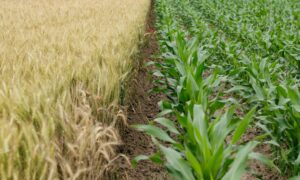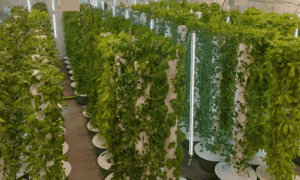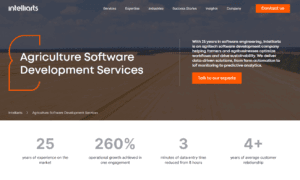Agriculture is an industry that impacts all humanity. As the world population increases, hunger and the demand for food increases with it, while the available agricultural land area continues to decrease and the need for growing crops more smartly and efficiently increases.
World Hunger Is a “Growing” Problem
Economic downturns in 2020, including those resulting from COVID-19 containment measures, contributed to one of the largest increases in world hunger in decades, affecting almost all low- and middle-income countries.
Hunger is worsening worldwide. As many as 828 million people — about 10% of the global population — regularly go to bed hungry.
Food insecurity is growing. In 2022, nearly 258 million people across 58 countries faced crisis or higher levels of food insecurity, according to the World Food Programme (WFP). Looking to 2028, the global severely food insecure population is projected to hit 956 million.
To feed the world’s growing population, farmers must sustainably, cost-effectively, and efficiently increase crop yields without harming the environment. The 21st-century concept of sustainable agriculture is consciously built on an ethical foundation. An underlying goal is to create a balanced and harmonious global agricultural economy in light of the demand for healthier, more sustainable products in greater quantities than ever before.
Fertilizers are behind the bulk of global food production and they’re especially important in developing countries.
Why Fertilizers?
Would you have imagined that soil needs food? Soil is a living factory of microscopic workers who need food to eat and places to live to do their work. Amazingly, there are more individual organisms in a teaspoon of soil than people on earth; thus, these living organisms control the soil and its processes.
The living ‘soil factory’ is powered primarily by sunlight. Soil microorganisms are responsible for decomposing organic matter and releasing plant-available nutrients. Fertilizers supplement the output of this mini-factory by supplying nutrients that are in short supply or are absent.
Fertilizers Have to Get Smarter, Efficient, and Sustainable
Most people don’t think about fertilizers, but few innovations are as central to modern life. In the 20th century, human-made fertilizer helped avert catastrophe on a massive scale. With population growth outstripping the food supply, experts predicted millions would starve. Fertilizers helped farmers grow more food on less land and feed a growing population, proving the experts wrong.
When using standard fertilizers, a relatively small amount of those nutrients makes their way into the plants. Instead, much of the nitrogen goes into the atmosphere as greenhouse gases, and phosphorus ends up in watersheds, frequently triggering excessive growth of algae and other organisms in waterways and lakes.
Fertilizers have to get smarter, more efficient, and sustainable. This is where ICL enters the picture with our New Fertilizer Technology.
New Fertilizer Technology
New fertilizer technology is focused on improving the efficiency and utilization rate of fertilizer, rather than simply increasing soil’s nutrient level. This means avoiding soil depletion, reducing carbon footprint at every production and supply chain stage, and minimizing waste.
What’s New in Fertilizer Technology?
ICl Group, one of the world’s leading fertilizers manufacturers, provides farmers with a wide range of high-performance advanced agricultural solutions, including high-end specialty products for every need. Their new technology fertilizers include eqo.x and eqo.s controlled-release fertilizers, the first-of-its-kind biodegradable coating technology that precisely controls nutrient release, significantly improving crop yield and reducing environmental impact by minimizing nutrient leaching and greenhouse gas emissions. In addition to these, ICL’s portfolio includes additives like Fertivants, adjuvants, biostimulants, and microbial solutions that are part of the ICL solution to efficient, effective agriculture and are used in foliar, drip, or soil irrigation.
This new fertilizer technology focuses on improving fertilizer efficiency and utilization rate rather than simply increasing the soil’s nutrient level. This means avoiding soil depletion, reducing carbon footprint at every production and supply chain stage, and minimizing waste. They provide growers with fertilizers that efficiently deliver the correct amount of nutrients to the plant and reduce fertilizer run-off.
Controlled Release Fertilizers (CRF)
CRF’s offer benefits of higher nutrient efficiency through reduced fertilizer losses in runoff, and enhanced crop uniformity thanks to controlled nutrition.
In this way the producer can optimize nutrient levels through the entire plant’s growth cycle with a simple one-time application, thus achieving maximum results with minimal effort. The number of applications needed is significantly reduced, resulting in less fuel for vehicles and less labor.
Biostimulants
New Fertilizer Technology goes beyond only nitrogen, phosphorus, and potassium. Biostimulants are products that reduce the amount of fertilizer required and increase plant growth, resistance to water, and abiotic stresses.
Due to environmental considerations, products derived from renewable and sustainable resources like beneficial bacteria are increasing. These substances are efficient, favoring the good performance of the plant’s vital processes, and allowing high yields and good quality products. They stimulate natural processes to bring benefits in nutrient uptake and efficiency as well as tolerance to abiotic (physical rather than biological) stress – thereby improving overall crop performance.
Achieving More with Less
As a leading global specialized fertilizer manufacturer, ICL recognizes the importance of providing innovative solutions to agriculture for improved yields in an environmentally responsible and sustainable practice by optimizing the way fertilizers work. Our New Fertilizer Technology does just that.
We utilize the best ingredients to provide consistently reliable and quality products for optimum plant growth across a range of different plant types and via different delivery systems.
In this way, we are contributing vital products to feed the world’s growing population by providing farmers with smart products to increase crop yields cost-effectively and efficiently without harming the environment.
Written by Jacobo Weizenblut, CEO of Tradingadr.com. With over 20 years of experience investing and analyzing world indexes, he brings his vast experience and shares his knowledge in trading world markets and companies, with expertise in technology, energy and sustainability.



































